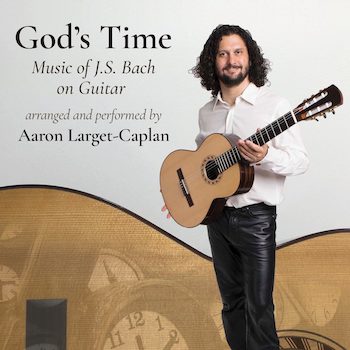Classical Album Review: “God’s Time” — Guitarist Aaron Larget-Caplan Plays the Music of J. S. Bach
By Jonathan Blumhofer
Guitarist Aaron Larget-Caplan new release is arresting for how natural the transcriptions sound: it’s as though they’d been intended for this instrumentation all along.
 The sheer instrumental flexibility of J. S. Bach’s music perhaps shouldn’t be as surprising as it is: after all, he repurposed spades of his own compositions (violin concertos remade for keyboard, anyone?) during his lifetime. Still, that so much of it transfers seemingly effortlessly between instruments and ensembles without losing any of its essential character is amazing. One could hardly do the same with, say, Bartók.
The sheer instrumental flexibility of J. S. Bach’s music perhaps shouldn’t be as surprising as it is: after all, he repurposed spades of his own compositions (violin concertos remade for keyboard, anyone?) during his lifetime. Still, that so much of it transfers seemingly effortlessly between instruments and ensembles without losing any of its essential character is amazing. One could hardly do the same with, say, Bartók.
Granted, going from keyboard to guitar is a bit less dramatic than from orchestra to solo cello. Even so, God’s Time, the latest release (on Tiger Turn) from guitarist Aaron Larget-Caplan, is at once arresting for how natural the transcriptions sound: it’s as though they’d been intended for this instrumentation all along.
Then there are the performances, themselves, which are consistently graceful, transparent, and well-shaped. Textural clarity and a strong sense of direction are hallmarks of Larget-Caplan’s performance of the Prelude, Fugue, & Allegro in E-flat, while he manages to whip up quite the little tempest in the Chromatic Fantasy in D minor.
A pair of preludes from The Well-Tempered Clavier (nos. 1 and 8) flow serenely, while his arrangement of the radiant prelude to the cantata Gottes Zeit is die allerbeste Zeit – possibly the most beautiful thing Bach wrote – ought to take its place next to György Kurtág’s two-piano transcription. The D-minor “Fiddle” Prelude and Fugue is, likewise, smartly paced and cleanly voiced.
One of the real charms of this recording is the amount of material Larget-Caplan gleaned from Bach’s less-familiar teaching materials, particularly the sets of 12, 6, and 5 “Little Preludes” that were originally intended for his sons’ keyboard lessons. Of course, there’s nothing pedantic about the music and they fit the guitar perfectly.
Highlights include the tastefully embellished repeats in the second of the set of six and snapping mordants in No. 5 from the collection of twelve. A dancing rendition of the Fugue in C minor – the only two-voice fugue I know – round things out.
Taken together, this is a compelling collection whose short-ish run-time of around fifty minutes paradoxically feels right: Larget-Caplan is an artist who clearly understands the need to keep his audience hungry for more. Mission accomplished.
Jonathan Blumhofer is a composer and violist who has been active in the greater Boston area since 2004. His music has received numerous awards and been performed by various ensembles, including the American Composers Orchestra, Kiev Philharmonic, Camerata Chicago, Xanthos Ensemble, and Juventas New Music Group. Since receiving his doctorate from Boston University in 2010, Jon has taught at Clark University, Worcester Polytechnic Institute, and online for the University of Phoenix, in addition to writing music criticism for the Worcester Telegram & Gazette.
